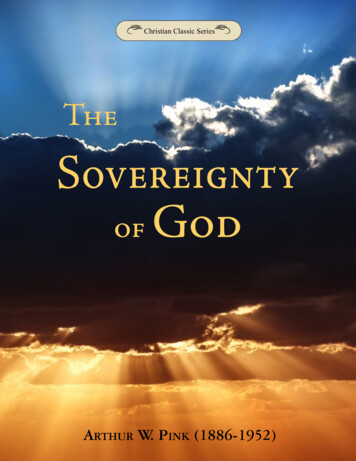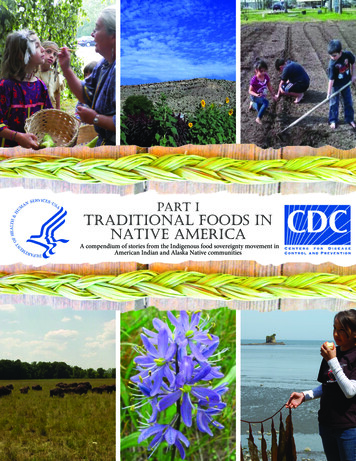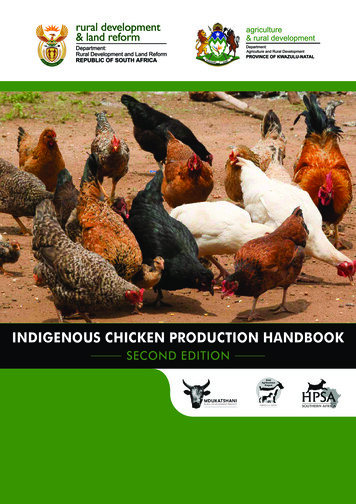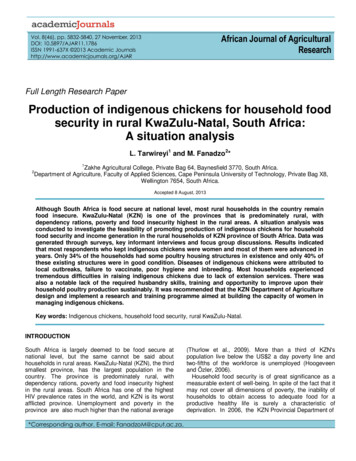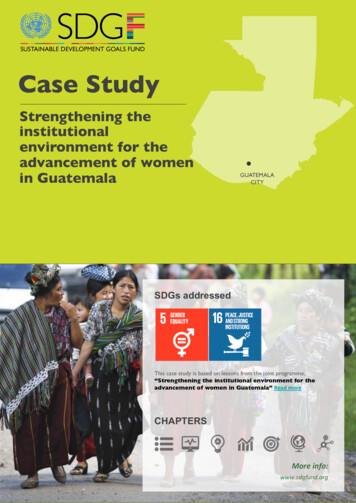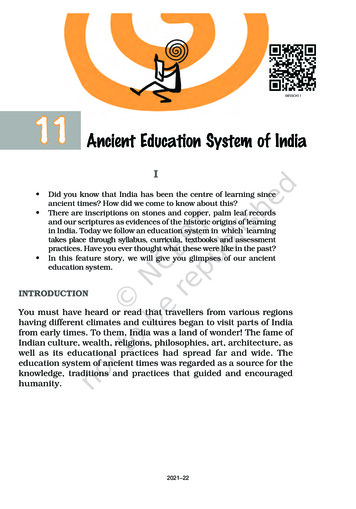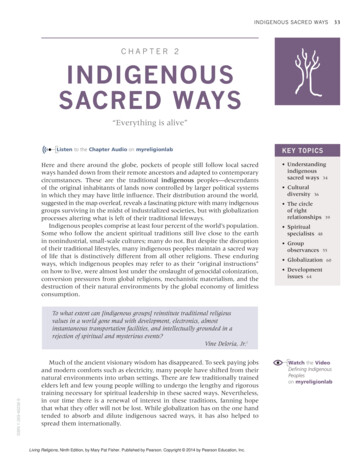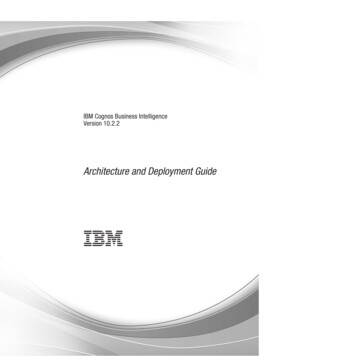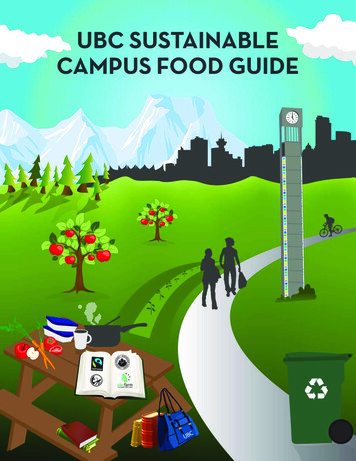
Transcription
INDIGENOUS DATASOVEREIGNTYTOWARD AN AGENDA
INDIGENOUS DATASOVEREIGNTYTOWARD AN AGENDAEdited byTAHU KUKUTAI AND JOHN TAYLORCentre for Aboriginal Economic Policy ResearchCollege of Arts and Social SciencesThe Australian National University, CanberraRESEARCH MONOGRAPH NO. 382016
Published by ANU PressThe Australian National UniversityActon ACT 2601, AustraliaEmail: anupress@anu.edu.auThis title is also available online at press.anu.edu.auNational Library of Australia Cataloguing-in-Publication entryTitle:Indigenous data sovereignty : toward an agenda / editors:Tahu Kukutai, John Taylor.ISBN:9781760460303 (paperback) 9781760460310 (ebook)Series:Research monograph (Australian National University. Centrefor Aboriginal Economic PolicyResearch) ; no. 38.Subjects:Indigenous peoples--Statistics.Aboriginal Australians--Legal status, laws, etc.Aboriginal Australians--Statistics.Records--Access control--Australia.Maori (New Zealand people)--Legal status, laws, etc.Maori (New Zealand people)--Statistics.Records--Access control--New Zealand.Other Creators/Contributors:Kukutai, Tahu, editor.Taylor, John, 1953- editor.Dewey Number:305.89915All rights reserved. No part of this publication may be reproduced, stored in aretrieval system or transmitted in any form or by any means, electronic, mechanical,photocopying or otherwise, without the prior permission of the publisher.Cover design and layout by ANU Press.Cover photograph: Preston Singletary and Lewis Tamihana Gardiner Whale rider 2007.Glass (blown and sand-carved), pounamu (New Zealand jade), pāua (New Zealandabalone), 20 x 24.5 x 6 inches (50.8 x 62.2 x 15.2 cm incl. base). Photo RussellJohnson. This powerful collaborative work brings together the artistic traditionsof Tlingit of the Northwest Coast of Canada and Māori of Aotearoa/New Zealand.It reflects the spirit of this book, showing another way in which indigenous peoplesare collaborating across international borders to make themselves visible and heard.This edition 2016 ANU Press
ContentsList of figures . . . . . . . . . . . . . . . . . . . . . . . . . . . . . . . . . . . . . . . . . . . . viiList of tables. . . . . . . . . . . . . . . . . . . . . . . . . . . . . . . . . . . . . . . . . . . . . ixAbbreviations. . . . . . . . . . . . . . . . . . . . . . . . . . . . . . . . . . . . . . . . . . . . xiContributors. . . . . . . . . . . . . . . . . . . . . . . . . . . . . . . . . . . . . . . . . . . . xvPreface. . . . . . . . . . . . . . . . . . . . . . . . . . . . . . . . . . . . . . . . . . . . . . . . xxi1.Data sovereignty for indigenous peoples:current practice and future needs. . . . . . . . . . . . . . . . . . . . . . . . . 1Tahu Kukutai and John TaylorPart 1: Decolonising indigenous data2.Data and the United Nations Declaration on theRights of Indigenous Peoples. . . . . . . . . . . . . . . . . . . . . . . . . . . 25Megan Davis3.4.What does data sovereignty imply: what does it look like?. . . . . 39C Matthew SnippColonialism’s and postcolonialism’s fellow traveller: thecollection, use and misuse of data on indigenous people. . . . . . 57Ian PoolPart 2: Critiques of official statistics5.Data politics and Indigenous representationin Australian statistics. . . . . . . . . . . . . . . . . . . . . . . . . . . . . . . . . 79Maggie Walter6.Indigenising demographic categories: a prolegomenonto indigenous data sovereignty. . . . . . . . . . . . . . . . . . . . . . . . . . 99Frances Morphy7.Governing data and data for governance: the everydaypractice of Indigenous sovereignty . . . . . . . . . . . . . . . . . . . . . . 117Diane E Smith
Part 3: Data sovereignty in practice8.9.Pathways to First Nations’ data and information sovereignty. . .139First Nations Information Governance Centre (FNIGC)Tribal data sovereignty: Whakatōhea rights and interests . . . . . 157Maui Hudson, Dickie Farrar and Lesley McLean10. The world’s most liveable city—for Māori: data advocacyand Māori wellbeing in Tāmaki Makaurau (Auckland) . . . . . . . . 179James Hudson11. Indigenous data sovereignty: a Māori health perspective . . . . . 193Rawiri Jansen12. Aboriginal and Torres Strait Islander community wellbeing:identified needs for statistical capacity. . . . . . . . . . . . . . . . . . . 213Ray Lovett13. Data sovereignty for the Yawuru in Western Australia . . . . . . . . 233Mandy Yap and Eunice Yu14. Building a data revolution in Indian country. . . . . . . . . . . . . . . . 253Desi Rodriguez-LonebearPart 4: State agency responses15. The Australian Bureau of Statistics’ Aboriginal and TorresStrait Islander enumeration and engagement strategies:challenges and future options. . . . . . . . . . . . . . . . . . . . . . . . . . 275Paul Jelfs16. Indigenous peoples and the official statistics systemin Aotearoa/New Zealand. . . . . . . . . . . . . . . . . . . . . . . . . . . . . 291Darin BishopIndex . . . . . . . . . . . . . . . . . . . . . . . . . . . . . . . . . . . . . . . . . . . . . . . . 307
List of figuresFigure 10.1 The Māori Plan for Tāmaki Makaurau . . . . . . . . . . . . . 185Figure 11.1 Mana Kidz data scorecard . . . . . . . . . . . . . . . . . . . . . . 199Figure 11.2 The AWHI data scorecard . . . . . . . . . . . . . . . . . . . . . . 203vii
List of tablesTable 5.1 OLS regression variable description and coefficientspredicting ‘attitudes to Aboriginal issues’ scores. . . . . . . . . . . 89Table 7.1 Data for building and evaluating indigenousgovernance arrangements. . . . . . . . . . . . . . . . . . . . . . . . . . . . 124Table 9.1 Data sovereignty: articulating tribal rightsand interests for Whakatōhea. . . . . . . . . . . . . . . . . . . . . . . . . 172Table 13.1 Timeline of the Yawuru native title determinationand subsequent actions to implement the Knowledgeand Wellbeing Project . . . . . . . . . . . . . . . . . . . . . . . . . . . . . . 241Table 13.2 Examples of grounded community-drivenapproaches for deriving measures of wellbeing . . . . . . . . . . . 246Table 14.1 Tribal data sources and identifiers. . . . . . . . . . . . . . . . . 260Table 15.1 Characteristics of solution-centredand collection-centred statistics. . . . . . . . . . . . . . . . . . . . . . . 289Table 16.1 Key stages of the data collection and survey cycle. . . . . 293ix
Abbreviations5D SAAuSSAAWHIBIACAEPRCANZUSCCOHCOAGCSIROCVDDD/PPfive ‘Ds’ of Indigenous Australian dataAustralian Aboriginal and Torres StraitIslander Health SurveyAustralian Bureau of StatisticsAssembly of First NationsAustralian Health Ministers Advisory GroupAmerican Indian and Alaska NativeAustralian Institute of Health and WelfareAlaska Native Regional CorporationThe Australian National UniversityAlaska Native Village Statistical AreaAustralian Public Serviceacute rheumatic feverAcademy of the Social Sciences in AustraliaAustralian Survey of Social AttitudesAuckland Wide Healthy Homes InitiativeBureau of Indian AffairsCentre for Aboriginal Economic Policy ResearchCanada, Australia, New Zealand and theUnited StatesChiefs Committee on HealthCouncil of Australian GovernmentsCommonwealth Scientific and IndustrialResearch Organisationcardiovascular diseasedeficit data/problematic peoplexi
Indigenous Data SGMAEMASTMCTMSBNAGATSIHIDNATSISSxiidistrict health boarddata sovereigntydata suzeraintyEconomic and Social CouncilField Epidemiology Training ProgramFirst Nations Information Governance CentreGroup A Streptococcalgross domestic productGeographical Information Systemgeneral practitionerHousehold Income and Labour Dynamics in AustraliaDepartment of Housing and Urban Development (US)Indigenous Community Engagement StrategyIndigenous community governanceinformation and communication technologyIntegrated Data InfrastructureIndependent Expert Advisory GroupIndigenous Engagement Managerinternational governmental organisationInternational Labour OrganizationIndependent Māori Statutory Boardintellectual propertyinstitutional review boardinformation technologyLongitudinal Survey of Indigenous ChildrenMetro Auckland Data Stewardship GroupMaster of Applied EpidemiologyMaths as Story TellingMinnesota Chippewa TribeMedical Services BranchNational Advisory Group on Aboriginal andTorres Strait Islander Health Information and DataNational Aboriginal and Torres Strait IslanderSocial Survey
AbbreviationsNCATSISNCEPHNGONHCNHMRCNHTNIHBNSOOCAP CUNUNDRIPUNPFIIVETWIPOYKCNational Centre for Aboriginal and Torres StraitIslander StatisticsNational Centre of Epidemiology andPopulation Healthnongovernmental organisationNational Hauora CoalitionNational Health and Medical Research Councilnational health targetNon-Insured Health Benefitsnational statistics officeownership, control, access and possessionOvercoming Indigenous disadvantage reportordinary least-squaresOklahoma Tribal Statistical Areaprimary health care organisationProgramme for International Student Assessment(First Nations and Inuit) Regional Health SurveyRoyal New Zealand College of General PractitionersState American Indian ReservationSustainable Development GoalState Designated Tribal Statistical AreaTribal Designated Statistical AreaTe Mana RaraungaTrans-Pacific PartnershipUniversity of British ColumbiaUnited NationsUnited Nations Declaration on the Rightsof Indigenous PeoplesUnited Nations Permanent Forum onIndigenous Issuesvocational education and trainingWorld Intellectual Property OrganizationYawuru Knowing our Community surveyxiii
ContributorsDarin Bishop (Ngāruahine, Taranaki) is Team Leader of OrganisationalKnowledge at Te Puni Kōkiri, the Ministry of Māori Development.He has had a long involvement with the development of Māori statisticsacross the official statistics system and was formerly a researcher in thenow disbanded Māori Statistics Unit at Statistics New Zealand. Alongwith former unit head Whetu Wereta, Darin played a critical role inthe development of the Māori Statistics Framework.Megan Davis is a Cobble Cobble Aboriginal woman from south-westQueensland. She is Professor of Law and Director of the IndigenousLaw Centre at the University of New South Wales. She is also aCommissioner of the NSW Land and Environment Court and a Fellowof the Australian Academy of Law. Megan is the Chair and expertmember of the United Nations Permanent Forum on IndigenousIssues and holds portfolios including Administration of Justice andGender and Women. She is a former fellow of the United Nations HighCommission for Human Rights and was one of the lawyers who draftedthe United Nations Declaration on the Rights of Indigenous Peoples.Dickie Farrar is the Chief Executive Officer of the Whakatōhea MāoriTrust Board. She affiliates to Whakatōhea, Te Whānau ā Apanui,Te Aitanga ā Mahaki and Ngāti Porou. She has experience at a seniorlevel in health, management and iwi development. She has heldpositions of general manager, CEO and directorships with a numberof iwi organisations and Māori trusts.James Hudson was raised in the Mataatua tribal region and is of theNgāti Awa, Tuhoe, Ngāti Pukeko and Ngaitai tribes. In his early career,James practised environmental and commercial law, specialising inMāori land law and tribal corporate and governance structures andTreaty of Waitangi settlements. He then took up an academic researchxv
Indigenous Data Sovereigntycareer specialising in Māori and indigenous governance, whilecompleting his doctorate, and developed a Māori-specific indicatorsframework to measure tribal outcomes. James is currently thePrincipal Adviser (Evaluation) for the Independent Māori StatutoryBoard, Tāmaki Makaurau (Auckland), leading their monitoring andreporting of Māori outcomes.Maui Hudson affiliates to Ngāruahine, Te Mahurehure andWhakatōhea and is currently a member of the Whakatōhea MāoriTrust Board. Maui is Associate Professor in the Faculty of Māori andIndigenous Studies at the University of Waikato and has researchinterests in the areas of ethics, innovation, the interface betweenindigenous knowledge and science and indigenous data sovereignty.Rawiri Jansen is of Ngāti Raukawa (Ngati Hinerangi) descent andwas formerly a resource teacher of Māori language in the Hawkes Bayarea before he completed his medical training in 2000. He has providedclinical teaching, Te Reo and Tikanga Māori programs for Māori healthprofessionals throughout Aotearoa/New Zealand. He is past chairmanof Te Ataarangi Trust (a national Māori language organisation) and isChairperson of Te Ohu Rata o Aotearoa (Māori Medical PractitionersAssociation). Rawiri’s main focus is on providing clinical leadershiptowards Māori health equity. He is currently a general practitionerin Auckland and Clinical Director for the National Hauora Coalition(a primary health care organisation).Paul Jelfs is General Manager of the Population and Social StatisticsDivision of the Australian Bureau of Statistics (ABS) in Canberra.He has extensive experience in Commonwealth and state governmentagencies in both information management and service delivery. He hasa background in public health and epidemiology and has driven largeinformation initiatives such as the Australian Health Survey, nationaland state-based cancer information systems, national disability andmortality data collections and Aboriginal and Torres Strait Islanderhealth and welfare information. Paul is the Senior ReconciliationChampion for the ABS.Tahu Kukutai belongs to the Waikato, Ngāti Maniapoto and Te Aupouritribes and is Associate Professor at the Institute of Demographic andEconomic Analysis, University of Waikato. Tahu specialises in Māoriand indigenous demographic research and has written extensively onissues of Māori and tribal population change, identity and inequality.xvi
ContributorsShe also has an ongoing interest in how governments around theworld count and classify populations by ethnic-racial and citizenshipcriteria. In a former life she was a journalist.Raymond (Ray) Lovett is a National Health and Medical ResearchCouncil Early Career Fellow and Research Fellow with the Epidemiologyfor Policy and Practice group at the National Centre for Epidemiologyand Population Health, The Australian National University. He alsoholds an adjunct Fellowship at the Australian Institute of Aboriginaland Torres Strait Islander Studies in the Indigenous Social and CulturalWellbeing group. Ray is an Aboriginal (Wongaibon) epidemiologistwith extensive experience in health services research and large-scaledata analysis for public health policy development and evaluation.Lesley McLean is coordinator of the tribal database for theWhakatōhea Māori Trust Board. She affiliates to Whakatōhea andTe Whānau ā Apanui. In her role, she is responsible for maintaining thedata integrity of the tribal database, connecting whānau genealogiesand linking them to local communities, as well as profiling Māori landwithin Whakatōhea’s tribal region.Frances Morphy is Honorary Associate Professor at the Centrefor Aboriginal Economic Policy Research at The Australian NationalUniversity and a 2015–16 Research Affiliate of the Center forAdvanced Study in the Behavioral Sciences at Stanford University.An anthropologist and linguist by training, her current researchconcerns the intersection between anthropology and demography,with a focus on Aboriginal Australian populations.Ian Pool is Emeritus Professor at Waikato University and Fellow ofthe Royal Society of New Zealand. He has analysed Māori populationssince 1958, publishing numerous books and articles on Māori, mostrecently Colonization and development, NZ 1769–1900: the seedsof Rangiatea (2015, Springer). Other recent books include (co‑authored)The New Zealand family (2007, AUP), (co-edited) Riding the agewaves (2005, Springer) and Age structural transitions: challenges fordevelopment (2006, CICRED). He has also published widely on Africandemography, population change in Aotearoa/New Zealand and otherissues. He has lived in eight countries and conducted missions forinternational agencies across francophone and anglophone Africa,Asia and the Pacific.xvii
Indigenous Data SovereigntyDesi Rodriguez-Lonebear is a citizen of the Northern CheyenneNation from Montana, USA. She is pursuing a dual PhD in demographyat the University of Waikato and sociology at the University ofArizona. Her doctoral research focuses on the count and classificationof American Indian tribal identity in US official statistics and tribaldata systems. She is an appointed member of the US Census Bureau’sNational Advisory Committee and a Graduate Research Associate atthe Native Nations Institute at the University of Arizona. She is aco‑founder of the US Indigenous Data Sovereignty Network.Diane E Smith is Senior Research Fellow and convenor of the HigherDegree by Research Program at The Australian National University’sNational Centre for Indigenous Studies. She has more than 40 yearsexperience working with Indigenous Australian communities andorganisations across Australia. She is a board member of the AustralianIndigenous Governance Institute. Diane was a chief investigator forthe Australian Indigenous Community Governance Research Project,the largest multidisciplinary comparative research investigation intoIndigenous governance undertaken in Australia (anu.edu/caepr/ICGP)and author of the subsequent Indigenous Governance Toolkit (aigi.com.au). Her PhD (Anthropology, ANU) investigated Indigenousmodes of networked governance and their intercultural articulationwith the Australian state.C Matthew Snipp is the Burnet C. and Mildred Finley WohlfordProfessor of Humanities and Sciences in the Department of Sociology atStanford University. He is also serving as the Chair of Native AmericanStudies and is the current Director of the Center for ComparativeStudies in Race and Ethnicity. His tribal affilitations are OklahomaCherokee and Choctaw.John Taylor is Emeritus Professor at the Centre for Aboriginal EconomicPolicy Research at The Australian National University. He is a Fellow ofthe Academy of the Social Sciences in Australia and a Policy Associateof the Aboriginal Policy Research Consortium (International) basedat the University of Western Ontario. He is a population geographerspecialising in the demography of indigenous peoples.Ceal Tournier is founding and current Chairperson of the FirstNations Information Governance Centre (FNIGC) headquarteredin Akwesasne, Ontario. She has been the FNIGC Saskatchewanrepresentative since 1995 and Regional Representative Co-chairxviii
Contributorssince 2002. Her background is in First Nations health and socialservices delivery. As General Manager of Health & Family ServicesInc. for the Saskatoon Tribal Council, she is well acquainted with theneeds of First Nations people, especially in regard to valid and qualitydata. She is a passionate advocate for the development of a frameworkthat will see First Nations as controllers of their own destiny.Maggie Walter is a member of the Palawa Briggs/Johnson TasmanianAboriginal family descended from the Pairrebenne people ofTebrakunna country, North Eastern Tasmania. She is Professor ofSociology and the Pro Vice-Chancellor of Aboriginal Research andLeadership at the University of Tasmania. She has published extensivelyin the field of race relations, inequality, and research methodsand methodologies, and is passionate about Indigenous statisticalengagement. Recent books include Indigenous statistics: a quantitativemethodology (with C Andersen, Left Coast Press, 2013) Inequality inAustralia: discourses, realities and directions (with D Habibis, 2nd edn,Oxford University Press, 2014). She is also the editor of Social researchmethods (3rd edn, Oxford University Press, 2013).Mandy Yap is a Research Fellow at the Crawford School of PublicPolicy at The Australian National University. She was previously aResearch Officer at CAEPR and a researcher at the National Centre forSocial and Economic Modelling, working on social exclusion, ageing,diabetes modelling and women and fertility issues. Her currentresearch interests include the role of gender equality in developmentand methodologies around constructing indicators of quality of lifeand wellbeing. Her doctoral research aims to develop culturallyrelevant and gender-sensitive indicators of wellbeing working withthe Yawuru community in Western Australia.Eunice Yu is a Yawuru woman from Broome, Western Australia.She has been employed at the Kimberley Institute since2008, undertaking strategic research to inform innovative policydevelopment. Prior to this, Eunice worked for the AustralianGovernment in various administrative and managerial positions.She has extensive experience at the community level in the areas ofculture, sports, education, child care and youth. She currently servesas a board member of the Kimberley Development Commission and sitson the Roundtable for Aboriginal and Torres Strait Islander Statisticswith the Australian Bureau of Statistics.xix
PrefaceThe twin problems of lack of reliable data and information onindigenous peoples and the biopiracy and misuse of their traditionalknowledge and cultural heritage are issues that have been grappledwith in the process of drafting and negotiating the United NationsDeclaration on the Rights of Indigenous Peoples (UNDRIP). It is ironicthat even with the emergence of the global ‘data revolution’ theseproblems persist in many countries where indigenous peoples live.The United Nations Permanent Forum on Indigenous Issues in itsfirst and second sessions (2002, 2003) already recognised that a keychallenge faced by national and international bodies is the lack ofdisaggregated data on indigenous peoples. The absence or lack of datathat reflect where and how many indigenous peoples there are, andhow they are faring in relation to the realisation of their individualand collective rights is directly related to the weakness of governmentsand intergovernmental bodies in formulating and implementingindigenous-sensitive decisions and programs.Several expert meetings and forum sessions have come up withrecommendations on how data collection and data disaggregation onindigenous peoples can be done and how and what indicators shouldbe used to measure implementation of the Millennium DevelopmentGoals, and now the newly adopted Sustainable Development Goals,in relation to realising indigenous peoples’ rights. Data should begenerated to measure how the rights of indigenous peoples to accessand ownership of lands, territories and resources are being met; howtheir participation in decision-making and control over their owndevelopment processes are progressing; what control over data andknowledge they are achieving; and what discrimination and exclusionthey experience in regard to their social, economic and cultural rights.xxi
Indigenous Data SovereigntyIn terms of approaches and methodologies, it was stressed in theseUN forums that indigenous peoples should control these data andthat their effective participation in data gathering and researchshould be ensured. Furthermore, resulting data should be availablefor use by them in policy articulation, in planning and in monitoringand evaluation efforts.Unfortunately, there is still a long way to go before such data collectionand disaggregation are done in most countries outside Canada,Australia, New Zealand, the United States and a few Latin Americancountries. A common problem raised by governments is the lack offinancial and technical resources to carry this out. Another unfoundedfear, which is repeatedly expressed by some governments, is thatgenerating disaggregated data can exacerbate discrimination and datadifferentiation can lead to conflicts.Such concerns and fears should not be used to deny indigenouspeoples their right to self-determination (Article 3, UNDRIP), which istheir right to determine their political status and to pursue freely theireconomic, social and cultural development. This right necessarilyincludes their right to have data and information collected, by themor jointly with them, that reflect their past and present realities andprovide the basis for their pursuit of self-determined economic,social and cultural development.The concept of data sovereignty, which is elaborated in this book,is linked with indigenous peoples’ right to maintain, control, protectand develop their cultural heritage, traditional knowledge andtraditional cultural expressions, as well as their right to maintain,control, protect and develop their intellectual property over these.The emergence of the global data revolution and associated newtechnologies can be a double-edged sword for indigenous peoples.If indigenous peoples have control over what and how data andknowledge will be generated, analysed and documented, and overthe dissemination and use of these, positive results can come about.The collection and disaggregation of data on indigenous peoples andthe documentation and transmission of their knowledge to youngergenerations can be facilitated. They can be the primary beneficiariesof the use of data, their knowledge and their cultural heritage.xxii
PrefaceIf, however, indigenous peoples lose control because there are noexisting laws and policies that recognise their rights and regulate thebehaviour of institutions and individuals involved in gathering anddisseminating data and knowledge, marginalisation, inequality anddiscrimination will persist. The respect of their right to have theirfree, prior and informed consent obtained before data are gatheredand disseminated is crucial to prevent this from happening.The efforts of the various authors in this book to theorise about andconceptualise data sovereignty, and provide case study examples ofits links to the realisation of the rights of indigenous peoples, arepioneering and laudable. I hope this book will initiate further debatesabout how the data revolution can be harnessed to facilitate thecollection and disaggregation of data on indigenous peoples. I alsohope that this book will inspire more indigenous peoples to assertand actualise their rights to control, own and further develop theirknowledge and cultural heritage and to effectively transmit theseto the younger generations.Victoria Tauli-CorpuzUN Special Rapporteur on the Rights of Indigenous PeoplesBaguio CityPhilippinesxxiii
1Data sovereignty for indigenouspeoples: current practiceand future needsTahu Kukutai and John TaylorOrigins of a conversationIn July 2015, an international group of scholars, representativesof indigenous organisations and government personnel from theCANZUS group of Anglo-settler democracies—Canada, Australia,Aotearoa/New Zealand and the United States—gathered in Canberrato participate in a workshop, ‘Data sovereignty for indigenous peoples:current practice and future needs’. The purpose of the workshop,sponsored by the Academy of the Social Sciences in Australia (ASSA)and the Centre for Aboriginal Economic Policy Research (CAEPR)at The Australian National University, was to identify and developan indigenous data sovereignty agenda, leveraging internationalinstruments such as the United Nations Declaration on the Rightsof Indigenous Peoples (UNDRIP).1 In an age when data permeateour lives daily, issues relating to data consent, use, ownership andstorage have become increasingly complex. While indigenous peopleshave long claimed sovereign status over their lands and territories,debates about ‘data sovereignty’ have been dominated by national1See: un.org/esa/socdev/unpfii/documents/DRIPS en.pdf.1
Indigenous Data Sovereigntygovernments and multinational corporations focused on issues of legaljurisdiction. Missing from those conversations have been the inherentand inalienable rights and interests of indigenous peoples relating tothe collection, ownership and application of data about their people,lifeways and territories. This book is the first to engage with the topicof data sovereignty from an indigenous standpoint, drawing on papersand discussions from the Canberra workshop. Although it is focusedon the CANZUS states, the intended audience is global and varied.It includes indigenous communities grappling with issues of identity,representation, participation and development; governments, agenciesand nongovernmental organisations (NGOs) seeking to formulatea response; and researchers trying to theorise and conceptualisea rapidly emerging field.The multifaceted nature of indigenous data sovereignty gives rise toa wide-ranging set of issues, from legal and ethical dimensions arounddata storage, ownership, access and consent, to intellectual propertyrights and practical considerations about how data are used in thecontext of research, policy and practice. Similarly, the scope of theindigenous data ecosystem is vast and includes data generated orheld by indigenous communities and organisations, governments, thepublic sector, international governmental organisations (IGOs), NGOs,research institutions and commercial entities. As the beginning pointof a conversation on indigenous data sovereignty, this book does nottry to comprehensively cover all facets. Rather, we have focused onthe areas for which we have collective expertise—as data users inresearch, policy, planning and governance contexts—leaving asidelegal, ethical, commercialisation and technological issues for futureexploration.The broad aim of this book is to stimulate new thinking and uncoveremergent practice regarding the generation of demographic, wellbeingand community development information in ways that better respondto the self-determination aspirations of indigenous peoples. To do so italso considers the implications of UNDRIP for the collection, ownershipand application of statistics pertaining to indigenous peoples andwhat these might mean for indigenous peoples’ sovereignty over dataabout them, their territories
Part 3: Data sovereignty in practice 8. Pathways to First Nations’ data and information sovereignty. .
